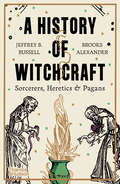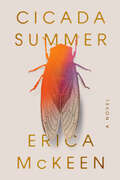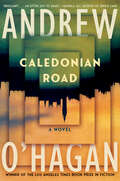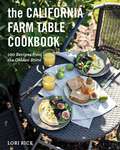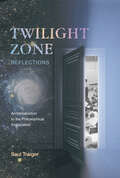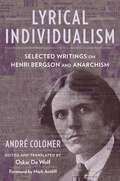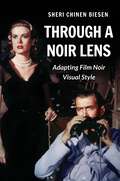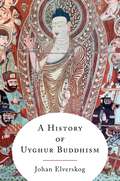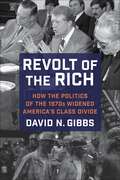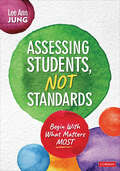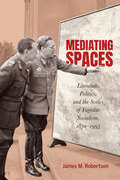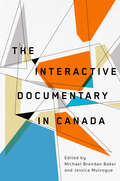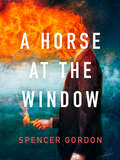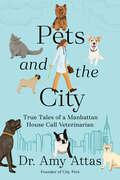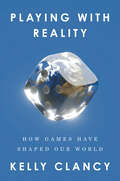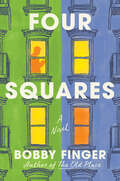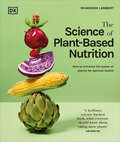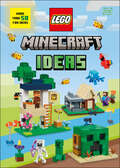- Table View
- List View
A History of Witchcraft (Third): Sorcerers, Heretics And Pagans
by Jeffrey B. Russell Brooks AlexanderAn authoritative and concise history of witchcraft from the ancient world up to the present day. Witchcraft has always been a fluid and intriguing belief system that has enchanted and sometimes terrified humanity. Now in its third edition, A History of Witchcraft has established itself as the authoritative history of witchery and the occult. Beginning with magic in the ancient world, Jeffrey B. Russell explores the definition of witchcraft in its many diverse forms, from the worship of the Greek goddess of magic, Hecate, and the witch crazes of the fifteenth and sixteenth centuries to the development of modern witchcraft by Aleister Crowley and Gerald Gardner in the early twentieth century. Brooks Alexander analyzes the development of witchcraft and neo-paganism in the present day, charting the dissemination of modern witchcraft through media and the tensions that arise when a secretive cult becomes an open and recognized religion. This updated edition features a new chapter exploring the challenges that witchcraft has faced in the past decade, including the rise of social media platforms such as Instagram and TikTok, the COVID-19 pandemic, and new neo-pagan groups.
Cicada Summer: A Novel
by Erica McKeenA woman, her grandfather, and her lover quarantine in the remote lakeside wilderness—where their world splits apart at the seams. In the summer of 2020, with a heat wave bearing down and a brood of periodical cicadas climbing into the trees, Husha mourns the recent death of her mother while quarantining with her ailing grandfather, Arthur, at his lakeside cabin in remote Ontario. They’re soon joined by Husha’s ex-lover, Nellie, who arrives without explanation to complete their trio. Also among them is a strange book, discovered by Husha while cleaning out her mother’s house. When she, Arthur, and Nellie begin to read it together, they learn that her mother’s last missive was a short story collection, crawling with unsettling imagery and terrifying transformations. As the stories bleed into their cloistered life in the cabin, they must each reckon with loss, longing, and what it means to truly know another person. Incantatory and atmospheric, Cicada Summer is a dazzlingly original novel about how we grieve and care for one another.
Caledonian Road: A Novel
by Andrew O'HaganA Finalist for the 2024 Orwell Prize for Political Fiction A biting portrait of British class, politics, and money told through five interconnected families and their rising—and declining—fortunes. Campbell Flynn, art historian, professor, and fêted fixture of the literati, always knew that when his life came crashing down, it would happen in public—yet he never imagined that a single year in London would expose so much. He’s never taken other people half as seriously as they take themselves, which is the first of his mistakes. The second is a new project: opportunistic and precisely calibrated to rake in a fortune. Riding on the high of a best-selling biography of Vermeer and fielding more inquiries and requests than he has the time or patience to pursue, Campbell has nevertheless still not managed to shake the question of money. The fact of his quiet loan from a school friend now embroiled in scandal makes the ever-present worry feel even more pressing. His unflappable agent, Atticus; his steadfast wife, Elizabeth; his sister, Moira, crusading parliamentarian for the poor; his well-adjusted, well-off adult children, Angus and Kenzie; and all the outward trappings of success can’t conceal that something in his life is off. As Campbell becomes increasingly entangled with a brilliant student, convention-smashing and working class, like he used to be, he feels he’s been given a second chance to embrace the change that frightens him, even as he sees trouble brewing for his family and friends. Campbell’s personal quest takes him down darker roads than he could have imagined, and all his worlds—the art scene and academia, fashion and the English aristocracy, journalism and the internet—collide in spectacular fashion, culminating in one shocking night on Caledonian Road.
The California Farm Table Cookbook: 100 Recipes from the Golden State
by Lori RiceFrom pomegranates and persimmons to meats and mushrooms, discover the best of California’s local food scene. If you like strawberries, almonds, or tomatoes, you can thank California—the Golden State produces nearly half of United States–grown fruits, nuts, and vegetables. Featuring innovative newcomers on the farm-to-table scene alongside family farms that have operated for generations, The California Farm Table Cookbook celebrates all the culinary contributions the state has to offer. Local author and photographer Lori Rice invites you to be a part of the independent farm community through dishes and stories that take you from salty waters and sandy beaches to rolling fields and rustic mountains. Each chapter is devoted to one of the state’s bountiful ingredients and the growers who cultivate them, with enticing recipes that highlight the region’s agricultural diversity. Complete with charming farm profiles, menus for seasonal get-togethers, and stunning, full-color photography, The California Farm Table Cookbook brings the sunny spirit and farm-fresh flavors of the Golden State right to your kitchen.
Living Things
by Munir HachemiWINNER OF A 2023 PEN TRANSLATES AWARDThis punk-like blend of Roberto Bolaño’s The Savage Detectives and Samanta Schweblin’s Fever Dream heralds an exciting new voice in international fictionLiving Things follows four recent graduates – Munir, G, Ernesto, and Álex – who travel from Madrid to the south of France to work the grape harvest. Except things don't go as planned: they end up working on an industrial chicken farm and living in a campground, where a general sense of menace takes hold. What follows is a compelling and incisive examination of precarious employment, capitalism, immigration, and the mass production of living things, all interwoven with the protagonist’s thoughts on literature and the nature of storytelling. "Gorgeously labyrinthine." – Molly McGhee, author of Jonathan Abernathy You Are Kind"Startling, compulsive, and vibrant; Living Things reads like an ignition. The most honest thing I’ve read in a long time about being young and alive in a beautiful, horrible world." – Dizz Tate, author of Brutes"Living Things dips blithely in and out of genres and packs more ideas in its lean frame than seems possible. It’s a novel posing as a journal posing as a meditation on the function of the journal that playfully interrogates form and content in art, what it means to write, and what it means to care or not care about anything, or about everything. Munir Hachemi is a magician, and his marvellous book, deftly translated by Julia Sanches, defies adequate description." – James Greer, author of Bad Eminence
Twilight Zone Reflections: An Introduction to the Philosophical Imagination
by Saul TraigerTwilight Zone Reflections is the first book of its kind to explore the entirety of The Twilight Zone (1959–1964) as a series. It acts as both an introduction to the field of philosophy and as a complete guide to the philosophical issues illustrated throughout the original 1959-64 television series. Author Saul Traiger explores each of the 156 episodes, investigating the show’s themes in metaphysics, epistemology, moral and political philosophy, and other topics in a way that is accessible to both seasoned philosophers and those outside academia. Each short chapter dives into a single episode and concludes with helpful cross-references to other episodes that explore similar philosophical problems and subjects. For example, a reader may be interested in questions about the nature of the mind and whether machines can think. By referencing this book, they could easily discover the thematic connections between episodes like “I Sing the Body Electric” or “The Lateness of the Hour,” and learn how both episodes introduce the viewer to possible worlds that challenge us to consider whether our idea of the mind, and even our very personhood, extends beyond the human to robots and other artificial intelligences. Each chapter introduces fundamental philosophical questions such as these through the lens of The Twilight Zone and inspires additional exploration. Further readings are suggested for all episodes, making this volume indispensable to academics, students, and fans of the show. Each chapter is short and accessible, ensuring that this book is the perfect resource to accompany a complete series re-watch. The Twilight Zone considered questions that strike at the heart of philosophical inquiry, such as the nature of self, the existence of god, the possibility of an afterlife, the relationship between knowledge and mental illness, the nature of possibility, even the nature of imagination itself, and so much more. Traiger argues that each episode can serve as an entry point for philosophical reflection. Twilight Zone Reflections is a valuable reference for anyone interested in exploring a well-known slice of popular culture history that doubles as a vast store of philosophical ideas.
Lyrical Individualism: Selected Writings on Henri Bergson and Anarchism (Columbia Themes in Philosophy, Social Criticism, and the Arts)
by Andre ColomerIn the early twentieth century, André Colomer was perhaps the best-known figure in the anarchist movement. A poet, philosopher, activist, and public speaker, he was enmeshed in the Parisian political and artistic scene at a time of political and cultural revolution. Amid the avant-garde explosions of Cubism, futurism, and surrealism and the ferment of radical politics on left and right, Colomer became anarchism’s leading advocate. He galvanized the Parisian public through his agitational writing and organizing, as well as his involvement in a sensational murder case, while developing a distinctive philosophical account of anarchist individualism. Yet Colomer died in obscurity in Moscow, abandoned by his friends and comrades, and is scarcely known in the English-speaking world today.Lyrical Individualism presents a selection of Colomer’s crucial writings, with a focus on anarchist theory and the philosophy of Henri Bergson. It reveals the richness of Colomer’s philosophical work, particularly his creative engagement with Bergson, Max Stirner, and Friedrich Nietzsche to forge a novel anarchist ideology. Colomer’s writings not only offer valuable insights into interwar anarchism, they also present a distinctive philosophical vision that in many ways anticipates theories and debates animating radical political movements today. This book also showcases his acerbic and pugnacious political commentary on the turbulent events of the 1910s and 1920s. The first translation and publication of Colomer’s work since his untimely death in 1931, Lyrical Individualism allows a range of readers to discover this vital thinker.
Through a Noir Lens: Adapting Film Noir Visual Style
by Sheri Chinen BiesenShadows. Smoke. Dark alleys. Rain-slicked city streets. These are iconic elements of film noir visual style. Long after its 1940s heyday, noir hallmarks continue to appear in a variety of new media forms and styles. What has made the noir aesthetic at once enduring and adaptable?Sheri Chinen Biesen explores how the dark cinematic noir style has evolved across eras, from classic Hollywood to present-day streaming services. Examining both aesthetics and material production conditions, she demonstrates how technological and industrial changes have influenced the imagery of film noir. When it emerged in the early 1940s, the visual style’s distinctive shadowy look was in part a product of wartime cinema conditions and technologies, such as blackouts and nitrate film stock. Since the 1950s, technical developments from acetate film stock and new cameras and lenses to lighting, color, and digitization have shaped the changing nature of noir style. Biesen considers the persistence of the noir legacy, discussing how neo-noirs reimagine iconic imagery and why noir style has become a touchstone in the streaming era. Drawing on a wealth of archival research, she provides insightful analyses of a wide range of works, from masterpieces directed by Billy Wilder and Alfred Hitchcock to New Hollywood neo-noirs, the Coen brothers’ revisionist films, and recent HBO and Netflix series.A groundbreaking technological and industrial history of an essential yet slippery visual style, Through a Noir Lens shines a light into the shadows of film noir.
A History of Uyghur Buddhism
by Johan ElverskogToday, most Uyghurs are Muslims. For centuries, however, Uyghurs were Buddhists. By around 1000 CE, they, like many of their neighbors, had decisively turned toward the Dharma, and a golden age of Uyghur Buddhism flourished under the Mongol empire. Dwelling along the Silk Road in what is now northwestern China, they stood at the center of Buddhist Eurasia, linking far-flung regions and traditions. But as Muslim power grew, Uyghur Buddhists converted to Islam, rewriting their past and erasing their Buddhist history.This book presents the first comprehensive history of Buddhism among the Uyghurs from the ninth to the seventeenth century. Johan Elverskog traces how the Uyghurs forged their distinctive tradition, considering a variety of social, political, cultural, and religious contexts. He argues that the religious history of the Uyghurs challenges conventional narratives of the meeting of Buddhism and Islam, showing that conversion took place gradually and was driven by factors such as geopolitics, climate change, and technological innovation. Elverskog also provides a nuanced understanding of lived Buddhism, focusing on ritual practices and materiality as well as the religion’s entanglements with economics, politics, and violence. A groundbreaking history of Uyghur Buddhism, this book makes a compelling case for the importance of the Uyghurs in shaping the course of both Buddhist and Asian history.
Revolt of the Rich: How the Politics of the 1970s Widened America's Class Divide
by David GibbsInequality in the United States has reached staggering proportions, with a massive share of wealth held by the very richest. How was such a dramatic shift in favor of a narrow elite possible in a democratic society? David N. Gibbs explores the forces that shaped the turn toward free market economics and wealth concentration and finds their roots in the 1970s. He argues that the political transformations of this period resulted from a “revolt of the rich,” whose defense of their class interests came at the expense of the American public.Drawing on extensive archival research, Gibbs examines how elites established broad coalitions that brought together business conservatives, social traditionalists, and militarists. At the very top, Richard Nixon’s administration quietly urged corporate executives to fund conservative think tanks and seeded federal agencies with free-market economists. Even Jimmy Carter’s ostensibly liberal administration brought deregulation to the financial sector along with the imposition of severe austerity measures that hurt the living standards of the working class. Through a potent influence campaign, academics and intellectuals sold laissez-faire to policy makers and the public, justifying choices to deregulate industry, cut social spending, curb organized labor, and offshore jobs, alongside expanding military interventions overseas.Shedding new light on the political alliances and policy decisions that tilted the playing field toward the ultrawealthy, Revolt of the Rich unveils the origins of today’s stark disparities.
Assessing Students, Not Standards: Begin With What Matters Most
by Lee Ann JungSee beyond content standards to the broader context of life-changing skills. The standards-based learning and grading movement of the past twenty years has ushered in a critical shift in assessment that demands clarity in both what is being measured and how well students are learning. Seeing the value in this evolution, a wave of schools has invested enormous effort to institutionalize the policy and practices of the movement. In doing so, many focused their initial efforts squarely on grading and fell short of the more important work–classroom assessment. There are important lessons in these missteps and failures. This groundbreaking, "next generation" approach to classroom assessment challenges educators to reflect on the connections between growth, mastery, and student self-efficacy and to prioritize the transferable skills of metacognition and self-regulation in assessments. A powerful call-to-action, this guide includes: A conceptual framework that guides the questions and order of assessment reform An approach to assessment, grading, and reporting that prioritizes student growth over a standard definition of success for everyone Strategies to develop metacognition and catalyze motivation in students Orientation to each chapter with learning intentions with success criteria Vivid case stories and prompts to power deep reflection Underscoring the importance of learning environments that work for the full range of learning profiles, this book calls for a revolution in the narrative around assessment and grading, emphasizing the ultimate goal of nurturing students who are metacognitive, expert learners, motivated by the joy of learning.
Assessing Students, Not Standards: Begin With What Matters Most
by Lee Ann JungSee beyond content standards to the broader context of life-changing skills. The standards-based learning and grading movement of the past twenty years has ushered in a critical shift in assessment that demands clarity in both what is being measured and how well students are learning. Seeing the value in this evolution, a wave of schools has invested enormous effort to institutionalize the policy and practices of the movement. In doing so, many focused their initial efforts squarely on grading and fell short of the more important work–classroom assessment. There are important lessons in these missteps and failures. This groundbreaking, "next generation" approach to classroom assessment challenges educators to reflect on the connections between growth, mastery, and student self-efficacy and to prioritize the transferable skills of metacognition and self-regulation in assessments. A powerful call-to-action, this guide includes: A conceptual framework that guides the questions and order of assessment reform An approach to assessment, grading, and reporting that prioritizes student growth over a standard definition of success for everyone Strategies to develop metacognition and catalyze motivation in students Orientation to each chapter with learning intentions with success criteria Vivid case stories and prompts to power deep reflection Underscoring the importance of learning environments that work for the full range of learning profiles, this book calls for a revolution in the narrative around assessment and grading, emphasizing the ultimate goal of nurturing students who are metacognitive, expert learners, motivated by the joy of learning.
Mediating Spaces: Literature, Politics, and the Scales of Yugoslav Socialism, 1870–1995
by James M. RobertsonThroughout the twentieth century in the lands of Yugoslavia, socialists embarked on multiple projects of supranational unification. Sensitive to the vulnerability of small nations in a world of great powers, they pursued political sovereignty, economic development, and cultural modernization at a scale between the national and the global – from regional strategies of Balkan federalism to continental visions of European integration to the internationalist ambitions of the Non-Aligned Movement.In Mediating Spaces James Robertson offers an intellectual history of the diverse supranational politics of Yugoslav socialism, beginning with its birth in the 1870s and concluding with its violent collapse in the 1990s. Showcasing the ways in which socialists in Southeast Europe confronted the political, economic, and cultural dimensions of globalization, the book frames the evolution of supranational politics as a response to the shifting dynamics of global economic and geopolitical competition. Arguing that literature was a crucial vehicle for imagining new communities beyond the nation, Robertson analyzes the manuscripts, journals, and personal correspondence of the literary left to excavate the cultural geographies that animated Yugoslav socialism and its supranational horizons. The book ultimately illuminates the innovative strategies of cultural development used by socialist writers to challenge global asymmetries of power and prestige.Mediating Spaces reveals the full significance of supranationalism in the history of socialist thought, recovering a key concern for an era of renewed geopolitical contestation in Eastern Europe.
Pharmacopoeias, Drug Regulation, and Empires: Making Medicines Official in Britain’s Imperial World, 1618–1968 (Intoxicating Histories #10)
by Stuart AndersonThe word "pharmacopoeia" has come to have many meanings, although it is commonly understood to be a book describing approved compositions and standards for drugs. In 1813 the Royal College of Physicians of London considered a proposal to develop an imperial British pharmacopoeia – at a time when separate official pharmacopoeias existed for England, Scotland, and Ireland. A unified British pharmacopoeia was published in 1864, and by 1914 it was considered suitable for the whole Empire.Pharmacopoeias, Drug Regulation, and Empires traces the 350-year development of officially sanctioned pharmacopoeias across the British Empire, first from local to national pharmacopoeias, and later to a standardized pharmacopoeia that would apply throughout Britain’s imperial world. The evolution of British pharmacopoeias and the professionalization of medicine saw developments including a transition from Galenic principles to germ theory, and a shift from plant-based to chemical medicines. While other colonial powers in Europe usually imposed metropolitan pharmacopoeias across their colonies, Britain consulted with practitioners throughout its Empire. As the scope of the pharmacopoeia widened, the process of agreeing upon drug standardization became more complex and fraught. A wide range of issues was exposed, from bioprospecting and the inclusion of indigenous medicines in pharmacopoeias, to adulteration and demands for the substitution of pharmacopoeial drugs with locally available ones.Pharmacopoeias, Drug Regulation, and Empires uses the evolution of an imperial pharmacopoeia in Britain as a vehicle for exploring the hegemonic power of European colonial powers in the medical field, and the meaning of pharmacopoeia more broadly.
The Interactive Documentary in Canada
by Michael Brendan Baker and Jessica MulvogueInteractive documentary emerged rapidly from a constellation of changing technologies and practices to much excitement, yet its history is short and its future uncertain. In the mid-2010s Canada was a world leader in the creation of i-docs. Less than a decade later technological obsolescence has rendered many of these celebrated projects inaccessible, while rapid digital innovation continues to change the i-doc form and its modes of experience.The Interactive Documentary in Canada captures this transitional moment in documentary filmmaking and media production. Bringing together a range of historical, theoretical, and critical approaches, this collection examines the past – and the imagined future – of a nonfiction storytelling phenomenon that has Canadian institutions, figures, and works at its centre. Embracing a polyphonic conception of interactive documentary, the volume includes explorations of web-based, app-based, installation, and virtual reality works that push the boundaries of what is understood as documentary cinema. Leading documentary scholars and makers consider the historical and technological contexts of i-doc production, innovation, and exhibition; the political and pedagogical potential of the genre; the ethics of the i‐doc experience; and the format’s future lifespan in the contemporary media landscape.The Interactive Documentary in Canada establishes a place for the i-doc in the history of Canadian film, highlighting the genre’s significant impact on the National Film Board of Canada and on contemporary global documentary media.
Out Here: Governor Sir Humphrey Walwyn’s Quarterly Reports from Newfoundland, 1936–1946
by Melvin Baker and Peter NearyVice Admiral Sir Humphrey Thomas Walwyn (1879–1957) was the British-appointed governor of Newfoundland from 1936 to 1946 – a period of remarkable change that would culminate in Newfoundland’s union with Canada in 1949. Assembling records from the British national archives and the provincial archives in Newfoundland and Labrador, Out Here presents readers with Walwyn’s quarterly reports to the secretary of state for dominion affairs in London throughout his tenure as governor.Walwyn’s position offered him a unique vantage point on the political and economic situation in Newfoundland throughout this tumultuous period. His reports bear witness to profound change, chronicling the economic downturn experienced in the final years of the Great Depression, followed by the unprecedented prosperity sparked by the Second World War that set the stage for debates over governance and for significant constitutional advance. The detailed accounts of Walwyn’s daily life in Newfoundland feature rich descriptions of capital city, company town, and outport mores; they paint a picture of coastal life in the mid-twentieth century and introduce the wide array of characters the governor encountered.Throughout, the candid insider accounts of Governor Walwyn are augmented by expert historical context and illustrated with a generous selection of contemporary photographs. As a whole, Out Here stands as an invaluable primary-source record and an important trove of information on wartime experiences in Atlantic Canada.
A Horse at the Window
by Spencer GordonA genre-bending collection of dramatic monologues shining a light on the anxious, self-directed gaze that defines contemporary consciousness. Borrowing stylistic elements from the prose poem, faux memoir, online diatribe, and philosophical investigation, the twenty-five dramatic monologues in Spencer Gordon’s genre-bending collection shine a light on the anxious, self-directed gaze that defines contemporary consciousness. CEOs lose their obscene wealth in lurid hellrealms; an aspiring writer reassembles a personal history out of fragments from the 2000s; police cadets receive a curious crash course in transduction and ethics; the Great Pacific Garbage Patch and Deepwater Horizon oil spill reveal the immanent sublime. Ranging from ironic and furious to pleading and melancholic, Gordon’s speakers exist in a world of social media think pieces, hot takes and take downs, fake news and distorted facts, steeped in pop culture and its discontents. They are real people, intimate as kin. But they’re also pseudonyms, ghosts, and playbacks, echoing from insubstantial handles drifting on the web. They lie and lurk and love online, channelling the morphemes of digital language and filtering the concerns of self, performance, digital identity, and complicity through the irreverence, non-rationality, and surprising beauty of Zen.
Letters from Home: The Creation of Diaspora in Jewish Antiquity
by Malka Z. SimkovichThe announcement by the Persian king Cyrus following his conquest of Babylon in 539 BCE that exiled Judahites could return to their homeland should have been cause for celebration. Instead, it plunged them into animated debate. Only a small community returned and participated in the construction of the Second Temple in Jerusalem. By the end of the sixth century BCE, they faced a theological conundrum: Had the catastrophic punishment of exile, understood as marking God’s retribution for the people’s sins, come to an end?By the Hellenistic era, most Jews living in their homeland believed that life abroad signified God’s wrath and rejection. Jews living outside of their homeland, however, rejected this notion. From both sides of the diasporic line, Jews wrote letters and speeches that conveyed the sense that their positions had ancient roots in Torah traditions. In this book, Malka Z. Simkovich investigates the rhetorical strategies—such as pseudepigraphy, ventriloquy, and mirroring—that Egyptian and Judean Jews incorporated into their writings about life outside the land of Israel, charting the boundary-marking push and pull that took place within Jewish letters in the Hellenistic era. Drawing on this correspondence and other contemporaneous writings, Simkovich argues that the construction of diaspora during this period—reinforced by some and negated by others—produced a tension that lay at the core of Jewish identity in the ancient world. This book is essential reading for scholars and students of ancient Judaism and to laypersons interested in the questions of a Jewish homeland and Jewish diaspora.
Pets and the City: True Tales of a Manhattan House Call Veterinarian
by Dr. Amy AttasNew York City&’s premier &“house call veterinarian&” takes you into the exclusive penthouses and four-star hotel rooms of the wealthiest New Yorkers and shows that, when it comes to their pets, they are just as neurotic as any of us.When a pet is sick, people—even the rich and famous—are at their most authentic and vulnerable. They could have a Monet on the wall and an Oscar on the shelf, but if their cat gets a cold, all they want to talk about are snotty noses and sneezing fits. That&’s when they call premier in-home veterinarian Dr. Amy Attas.In Pets and the City, Dr. Amy shares all the funny, heartbreaking, and life-affirming experiences she&’s faced throughout her thirty-year career treating the cats and dogs of New Yorkers from Park Avenue to the projects. Some of her stories are about celebs, like the time she saw a famous singer naked (no, her rash was not the same as her puppy&’s). Others are about remarkable animals, like the skilled service dog who, after his exam was finished, left the room and returned with a checkbook in his mouth. Every tale in this rollicking, informative, and fun memoir affirms a key truth about animal, and human, nature: Our pets love us because their hearts are pure; we love them because they&’re freaking adorable. On some level, we know that by caring for them, we are the best version of ourselves. In short: Our pets make us better people.
Playing with Reality: How Games Have Shaped Our World
by Kelly ClancyA wide-ranging intellectual history that reveals how important games have been to human progress, and what&’s at stake when we forget what games we&’re really playing.We play games to learn about the world, to understand our minds and the minds of others, and to make predictions about the future. Games are an essential aspect of humanity and a powerful tool for modeling reality. They&’re also a lot of fun. But games can be dangerous, especially when we mistake the model worlds of games for reality itself and let gamification co-opt human decision making.Playing with Reality explores the riveting history of games since the Enlightenment, weaving an unexpected path through military theory, political science, evolutionary biology, the development of computers and AI, cutting-edge neuroscience, and cognitive psychology. Neuroscientist and physicist Kelly Clancy shows how intertwined games have been with the arc of history. War games shaped the outcomes of real wars in nineteenth and twentieth century Europe. Game theory warped our understanding of human behavior and brought us to the brink of annihilation—yet still underlies basic assumptions in economics, politics, and technology design. We used games to teach computers how to learn for themselves, and now we are designing games that will determine the shape of society and future of democracy.In this revelatory new work, Clancy makes the bold argument that the human fascination with games is the key to understanding our nature and our actions.
Middle of the Night: A Novel
by Riley SagerIn the latest jaw-dropping thriller from New York Times bestselling author Riley Sager, a man must contend with the long-ago disappearance of his childhood best friend—and the dark secrets lurking just beyond the safe confines of his picture-perfect neighborhood.The worst thing to ever happen on Hemlock Circle occurred in Ethan Marsh&’s backyard. One July night, ten-year-old Ethan and his best friend and neighbor, Billy, fell asleep in a tent set up on a manicured lawn in a quiet, quaint New Jersey cul-de-sac. In the morning, Ethan woke up alone. During the night, someone had sliced the tent open with a knife and taken Billy. He was never seen again.Thirty years later, Ethan has reluctantly returned to his childhood home. Plagued by bad dreams and insomnia, he begins to notice strange things happening in the middle of the night. Someone seems to be roaming the cul-de-sac at odd hours, and signs of Billy&’s presence keep appearing in Ethan&’s backyard. Is someone playing a cruel prank? Or has Billy, long thought to be dead, somehow returned to Hemlock Circle?The mysterious occurrences prompt Ethan to investigate what really happened that night, a quest that reunites him with former friends and neighbors and leads him into the woods that surround Hemlock Circle. Woods where Billy claimed ghosts roamed and where a mysterious institute does clandestine research on a crumbling estate. The closer Ethan gets to the truth, the more he realizes that no place—be it quiet forest or suburban street—is completely safe. And that the past has a way of haunting the present.
Four Squares
by Bobby FingerFrom the beloved author of The Old Place comes a tender, funny, and fresh novel about a gay writer in New York City whose life is irrevocably altered, and then again thirty years later.In 1992, on his thirtieth birthday, Artie Anderson meets the man who will change his life. Artie spends his days at a tedious advertising job, finding relief in the corner of New York City he can call his own, even as the queer community is still being ravaged by HIV. But when his birthday celebration brings Artie and his friends to his favorite bar, a chance encounter with Abe, an uptight lawyer and Artie&’s opposite in almost every way, pushes Artie to want, and to ask for, more for himself.Thirty years later, Artie is stunned when Halle and Vanessa, Abe&’s daughter and ex-wife, announce they are moving across the country. Artie has built a lovely, if small, life, but their departure makes Artie realize that he might be lonelier than he previously thought. When a surprising injury pushes Artie into the hands of GALS, the local center for queer seniors, a rambunctious group of elders insist on taking him under their wing.Alternating between both timelines, Four Squares is an intimate look at what it means to find community at any age. With humor and compassion, it honors the enduring power of queer friendship, its history, and how essential it is to keep those stories alive.
The Science of Plant-based Nutrition: How to Enhance the Power of Plants for Optimal Health
by Rhiannon LambertWith an overwhelming weight of evidence suggesting that plant-based eating is the way forward for both the planet and people, there are a wealth of misconceptions and unanswered questions that need to be addressed to help support not just the health of the population, but the health of the planet, too.In The Science of Plant-Based Nutrition, leading nutritionist Rhiannon Lambert is here to equip you with everything you need to know about plant-based diets, separating fact from fiction to help you and your family understand the importance of nutrition on our health while minimizing the impact we have on the environment. As with any diet, when you change what you eat, you also have to change the way you eat and how you think about food. This is simple, flexible, and nutritionally approved advice to help you navigate a plant-based diet without compromising on health. It's more important than ever to execute this way of eating correctly and to equip you all with the need-to-know nutritional basics.Covering every conceivable topic—from vegan and plant-based diets, sustainability, physical and mental health outcomes, and nutrition across the lifespan, to individual nutrients and supplements (and everything in between)—this book offers clear answers with informative graphics, making it easy to understand in order to enable you to make informed decisions that are best suited to your lifestyles about what, when, and how to eat responsibly for our own and the planet's health and happiness.
LEGO Minecraft Ideas (Lego Ideas)
by Julia March Shari LastLevel up your LEGO® Minecraft® models with more than 50 building ideas!Use your LEGO collection to bring your Minecraft builds to life. Inspire budding builders to design a diamond sword, build a busy biome, make a micro mob, create a creeper house, and much more. Challenge family and friends to exciting games that combine the best bits of Minecraft and LEGO building.© 2024 Mojang AB ©2024 The LEGO Group.
Little Rot: A Novel
by Akwaeke EmeziNAMED A MOST ANTICIPATED BOOK OF THE YEAR BY HARPER'S BAZAAR, PUBLISHERS WEEKLY, BOOKPAGE AND MORE!&“A masterwork…mesmerizing…We come away troubled, unsettled — and in some subtle way changed.&”–The New York TimesA thrilling new novel from the bestselling, award-winning, visionary Akwaeke Emezi One weekend. The elite underbelly of a Nigerian city. A party that goes awry. A tangled web of sex and lies and corruption that leaves no one unscathed. Aima and Kalu are a longtime couple who have just split. When Kalu, reeling from the breakup, visits an exclusive sex party hosted by his best friend, Ahmed, he makes a decision that will plunge them all into chaos, brutally and suddenly upending their lives. Ola and Souraya, two Nigerian sex workers visiting from Kuala Lumpur, collide into the scene just as everything goes to hell. Sucked into the city&’s corrupt and glittering underworld, they&’re all looking for a way out, fueled by a desperate need to escape the dangerous threat that looms over them.
